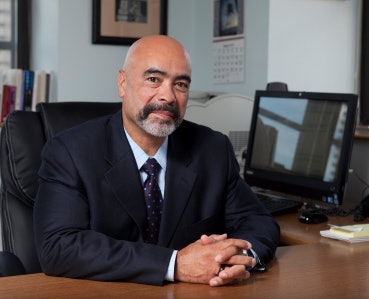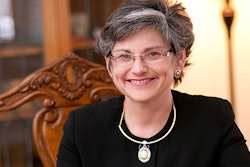 Juan Cartagena
Juan CartagenaJuan Cartagena, president and general counsel of LatinoJustice PRLDEF, said Thursday that “access to education today is as important to Latinos as it was to the Black community in the struggle with Medgar Evers.”
Cartagena was discussing civil rights issues that impact the Latino community and how higher education is part of the discussion during an hour-long Twitter chat. His organization (www.latinojustice.org) was founded in 1972 by three Puerto Rican attorneys from New York with the goal of changing discriminatory practices toward Latino communities.
“We fight for equal access housing & healthcare, public services in Spanish, #workersrights, immigrant/migrant rights & education,” tweeted Cartagena, a constitutional and civil rights attorney with extensive experience overseeing litigation on behalf of Latino and African-American communities.
The question was posed, “Where do you see higher education fitting into the civil rights agenda for the Latino community?”
Cartagena responded, “HigherEd & accessibility to HigherEd for minorities in the country is one of the major battles of the civil rights movement,” adding, “Education becomes the key to getting out of poverty & strengthening the economy of the whole world.”
When asked his position on affirmative action in education, Cartagena replied, “Our position is consistent w/everything we’ve done for decades, the use of race as one factor among many is very important. It ensures a diverse student body and that our colleges produce students that are well grounded in different opinions.”
LatinoJustice filed an amicus brief with the Supreme Court in the UT v. Fisher case. “We filed to let SCOTUS know that issue of #AffirmativeAction is equally as important in the Latino community as it is in others. We wanted to make sure #SCOTUS was aware how it impacts our community and benefits the entire country.”
Cartagena was questioned about the “Dreamers” fighting for access to higher education for undocumented youth. He praised their strength and innovation, referring to it as “classic civil rights activism. DREAMERs are pointing the way towards a more inclusive America.”
In a one-on-one interview with Diverse following the Twitter chat, Cartagena spoke about LatinoJustice’s goal to increase the number of Latinos going to law school through its LAWbound program.
“We provide opportunities for college students to come to our offices twice per year for intensive one-week exposure to different lawyering models,” he said. “We select them given their interest and commitment to Latino issues in the country. We give them a week of intensive LSAT prep, counseling, exposure to lawyering models outside of our own model of public interest lawyers. We give them opportunities to talk to judges, private attorneys, corporate attorneys, legal aid types and legal services types.”
The success with LAWbound has led to the development of other programs for young people interested in civil rights.
LatinoJustice’s youth leadership network helps empower a new generation of Latino advocates. “Our youth leaders utilize new media to design innovative and creative social advocacy campaigns & become agents of change!” he tweeted. “This past year, our students helped lend a youth voice to the issue of #stopandfrisk in NYC & created a documentary & SM campaign.” He referred people to this video: http://vimeo.com/55977221 and the website http://morethanaquota.org/.
Cartagena tweeted that Latinos currently exceed Whites in college enrollment in New York City, but there is a large dropout rate.
“Can we capitalize on the higher enrollment and ensure success throughout higher education settings?” he said to Diverse. “That depends on how long it’s taking our youth to finish a difficult four-year career in college. In many cases, it’s taking a lot longer than four years. That’s because we have a much higher enrollment at the community college level.”
Often, Latino students are going to community college to catch up on basic remediation. A goal is to improve the quality of public education in middle school and high school, so there is no need for catch-up.
In recognition of Hispanic Heritage Month, TTG+Partners chose “Latino Civil Rights & Higher Ed” as the subject for this month’s Twitter chat. TTG+Partners uses Twitter chats to spotlight hot topics and trends in higher education, especially as they relate to matters of diversity and equality.
“We wanted to have a dialogue with LatinoJustice that would focus on issues that affect the Latino community through the lens of higher education,” said Tia T. Gordon, founder and CEO of TTG+Partners. “Get their thoughts also on affirmative action in higher education. What does that mean for the Latino community?”



















